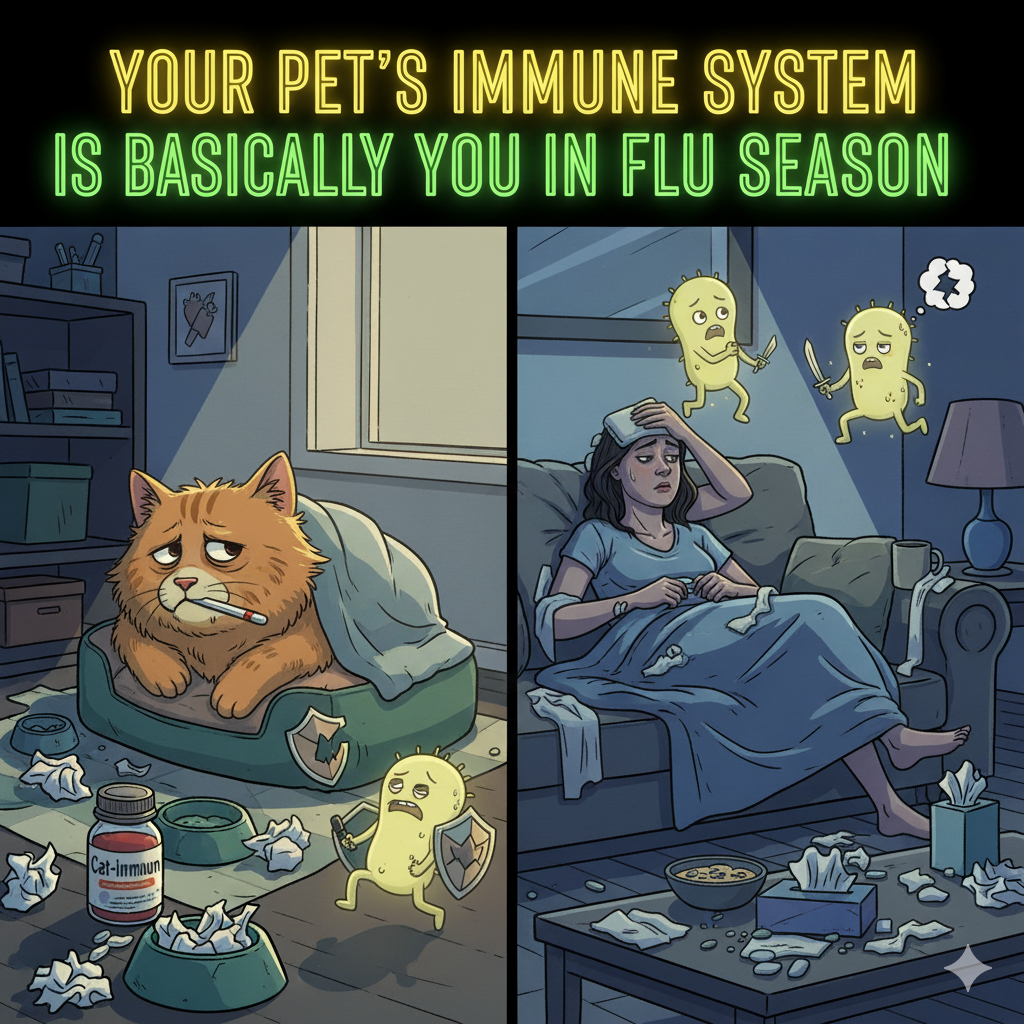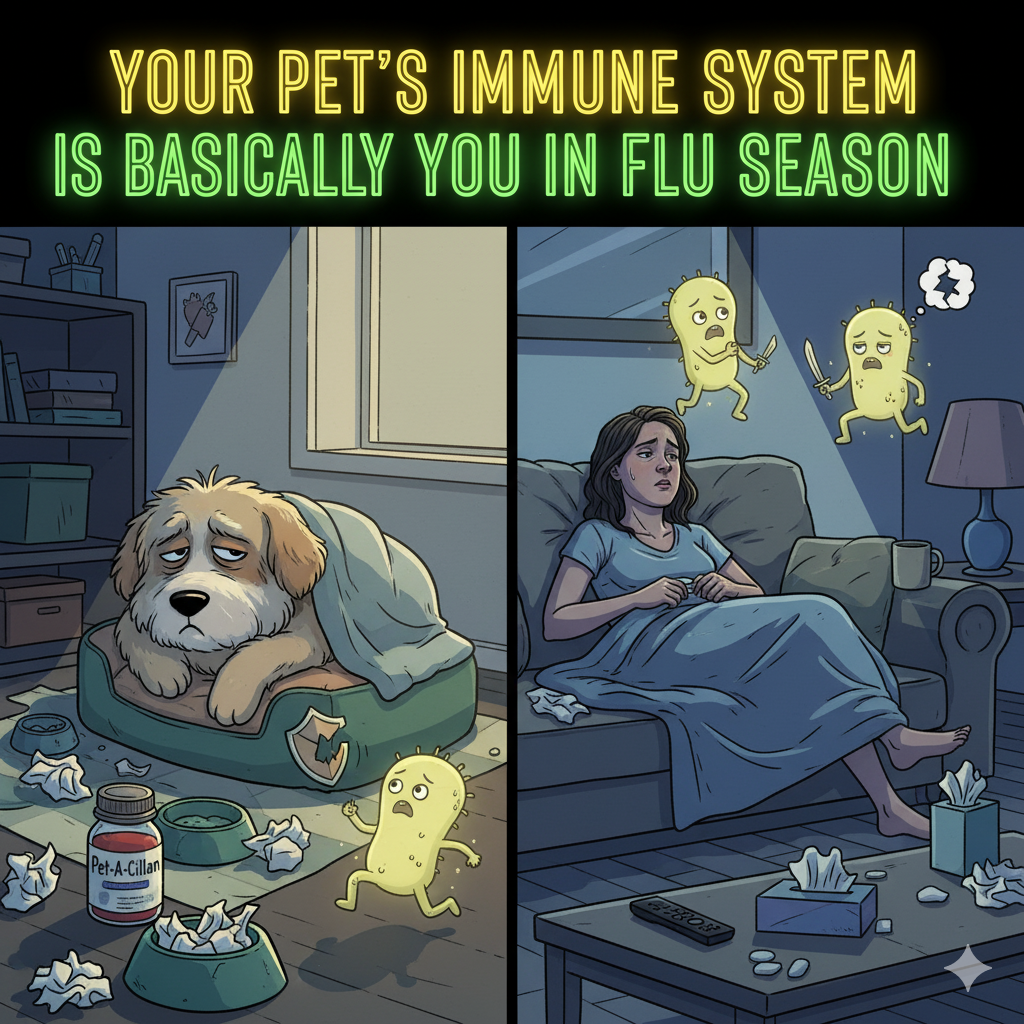Introduction: The Sniffles, the Drama, and the Panic Google Search
You know that feeling when you start sneezing and instantly convince yourself you’ve got the flu, a cold, and possibly the plague?
Yeah — that’s basically your pet’s immune system too.
One day, your dog’s bouncing off the walls like a furry ping-pong ball, and the next, they sneeze once, and you’re already on PetMD typing “dog sneezed — dying???”
Relax, human. Pets get off days too. Their immune system is tough, but also sensitive — kind of like you when the Wi-Fi goes out.
What Even Is an Immune System, Anyway?
Let’s skip the science lecture and get real: your pet’s immune system is like an army that defends against microscopic villains — viruses, bacteria, and whatever’s living under the couch that your dog probably licked last week.
When it’s working right, your pet’s immune system is a superhero.
When it’s weak, even a small bug can cause a week of vet visits, weird medicine smells, and “please eat this pill wrapped in cheese” negotiations.
And yes, stress, junk food, lack of sleep, and too much drama can make it weaker — just like you.
Chapter 1: The Germ Olympics — Pets Are Gold Medalists
Here’s the truth: your pet encounters more germs in one day than you do in a month.
Sniffing garbage?
Licking random park puddles?
Rolling in something mysterious that you pray isn’t poop?
Your furry buddy’s immune system is constantly training for the Germ Olympics.
But sometimes, it just can’t keep up — especially when they’re young, old, or dealing with a weakened system.
Common Signs Their Immune System Needs a Boost:
- Constant sneezing, coughing, or runny nose
- Dull coat and low energy
- Repeated infections (ear, skin, or stomach)
- Slow healing from small wounds
- “Meh” mood and appetite
Basically, if your pet starts acting like a lazy college student during finals week — it’s time to check in on their wellness routine.
Chapter 2: Nutrition — The Real Superpower
Just like you can’t survive on coffee and anxiety, your pet can’t thrive on cheap kibble and leftover fries.
Feed for Immunity:
- Lean proteins: chicken, fish, turkey (your pet’s muscle fuel).
- Antioxidant-rich foods: blueberries, spinach, pumpkin (yes, even pets need their veggies).
- Omega-3s: found in fish oil — helps reduce inflammation and makes coats shiny enough for Instagram.
- Probiotics: keep gut bacteria balanced and immune function strong.
Think of it like upgrading from “instant noodles” to “home-cooked meal.” Your pet deserves better than filler-filled kibble that tastes like sadness.
Chapter 3: Supplements — Because Sometimes Food Isn’t Enough
Let’s be honest: not every pet eats like a nutritionist.
Some would rather inhale a sock than touch spinach. That’s where supplements come in.
The Big 3 Immunity Helpers:
- Probiotics – good gut health = strong immune defense.
- Fish oil – reduces inflammation and keeps immune cells active.
- Vitamin E and C – natural antioxidants that help fight off illness.
But beware: don’t just toss random pills into their bowl. Always talk to your vet first — otherwise, you’ll end up spending your Sunday Googling “can dogs overdose on vitamins?” while your dog looks at you like “you fool.”
Chapter 4: Exercise — Move That Fluff
Yes, even old dogs and lazy cats need movement.
Exercise improves circulation, lowers stress, and strengthens immune function — just like it does for humans.
So take that walk, throw that toy, or create a DIY agility course with your furniture (you’ll regret it, but your pet won’t).
Just remember — don’t overdo it.
A 20-minute stroll is great; a marathon is not. Especially if your dog’s idea of cardio is trotting to the food bowl.

Chapter 5: The Sleep & Stress Equation
You know how you get cranky and sick after three nights of bad sleep?
Your pet’s the same.
Sleep is when their immune cells repair and recharge. Without it, they become vulnerable — and moody. Yes, animals can have moods.
Make sure they have a quiet, comfy sleeping space — no loud noises, bright lights, or your 2 a.m. YouTube habit blaring in the background.
And keep stress low. Too much yelling, loneliness, or chaos can cause stress hormones to rise, which suppresses immune function.
Basically, stop being dramatic in front of your dog — they absorb that energy.
Chapter 6: Hygiene — Because Germs Don’t Take Days Off
Your pet doesn’t need a bubble bath every day, but basic hygiene goes a long way.
Simple Hygiene Tips:
- Regular grooming removes dirt and allergens.
- Clean food and water bowls daily.
- Wash bedding weekly.
- Keep toys clean — yes, even that drool-covered one they “love.”
And for the love of fur, please stop letting your dog lick your face after sniffing other dogs’ butts. That’s not affection — that’s microbial warfare.
Chapter 7: Vet Visits — The Necessary Evil
Nobody likes going to the doctor — not you, not your pet, and definitely not your wallet.
But regular vet checkups are how you prevent major issues.
Get your pet’s vaccinations updated, run basic bloodwork once a year (especially for older pets), and don’t ignore subtle changes in behavior.
Because sometimes that “he’s just tired” turns into a big vet bill later.
Think of the vet as your pet’s personal immune system coach. Expensive, yes. But worth it.
Conclusion: You’re Basically the Immune System Manager Now
Here’s the truth: your pet’s immune system is resilient, but it mirrors your care.
If you’re stressed, tired, and skipping self-care, chances are your pet’s not doing much better.
Feed them well, let them rest, give them love, and keep your panic-Googling to a minimum.
Their immune system — and yours — will thank you.
Because at the end of the day, both of you are just trying to survive flu season with a blanket, a bowl of soup, and the hope that tomorrow brings more energy (and fewer sneezes).




